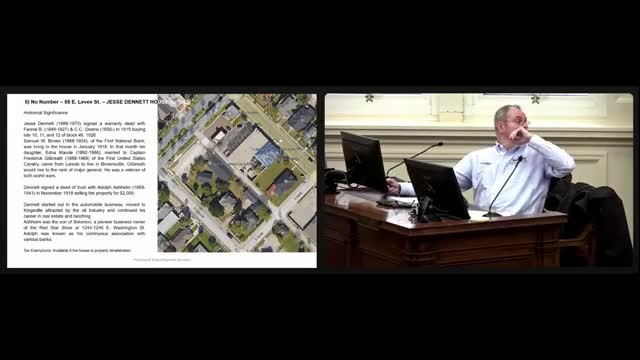Historic Preservation Commission denies tax-exemption request for 55 E. Lehi after owner failed to provide invoices
Get AI-powered insights, summaries, and transcripts
Subscribe
Summary
The Brownsville Historic Preservation Commission voted to deny a 2025 tax-exemption application for the Jesse Dennant house at 55 East Lehi, citing missing invoices and a failure to demonstrate the program—s minimum substantial-rehab spending requirement.
The Brownsville Historic Preservation Commission denied a 2025 tax-exemption application for the Jesse Dennant house at 55 East Lehi after staff said the applicant did not provide invoices to prove required rehabilitation spending.
Commission staff member Mr. Velez told the commission that the program—s substantial-rehabilitation threshold requires a minimum rehabilitation spending level (staff cited a $22,000 example for some projects) and, for this property—based on appraisal percentages discussed at the meeting—the owner needed to document about $17,974 (about 21 percent of appraisal value). Staff recommended denial because the owner had not submitted invoices showing that level of work and expenditures.
The owner—s representative said the house had been maintained and that work had been done over the years, including termite tenting, porch and ceiling repairs and painting, and that invoices exist but had not been provided to staff. The representative said the owner lives in the house and had invested money in upkeep. Mr. Velez responded that the commission and county require documentation—cancelled checks, receipts or invoices—to verify expenditures and that staff cannot make exceptions: "We require that from everybody else. We can't make an exception for this gentleman." The commission noted that prior program participation and prior blocks on properties make consistent documentation necessary.
Commissioners and staff discussed the program—s practice of treating a qualifying rehabilitation as a single-term investment that then yields a multi-year tax exemption (staff said qualifying work typically yields five years of tax relief). Staff also noted the program—s recent focus on substantial, one-time rehabs rather than smaller, ongoing maintenance for primary residences.
After closing the public hearing, a commissioner moved to deny the tax-exemption request; the motion was seconded and carried.
The commission and staff encouraged the owner to compile invoices and other proof of expenditures and to reapply in a future year after documenting the required spending. Staff suggested the applicant could start assembling records now so the matter could be reconsidered for the following tax cycle.
